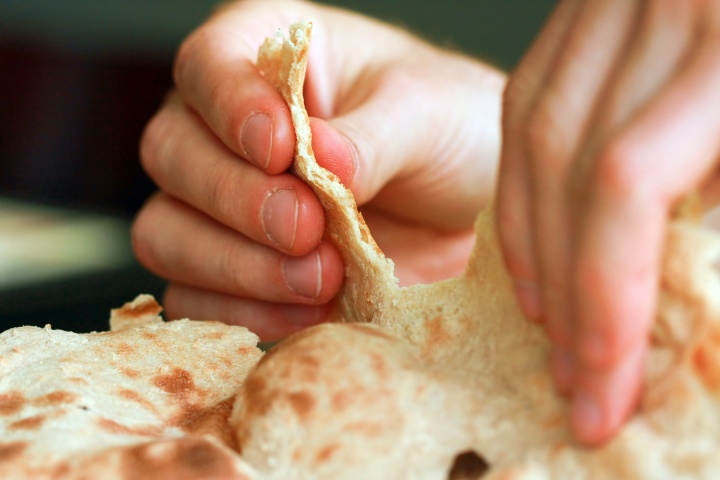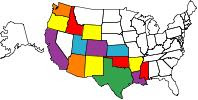For “Scripture Sunday”:
The Chumps Who Had to Move the Tabernacle
April 5, 2019 Sabbath Thought
“The Israelites spent 40 years wandering through the wilderness on their way to the Promised Land.
That’s 40 years of setting up camp and taking down camp.
Forty. Years. Every time God told them to move, it was a process. Setting up. Taking down. Setting up. Taking down. Setting up…
And on and on and on.
I’m sure that got old fast. I get tired of setting up and taking down tents after just one camping trip, and that’s with a modern, lightweight tent held up by those fancy fiberglass rods that practically put themselves together. The Hebrew text isn’t super definitive on the point, but I feel confident in saying those weren’t the kind of tents the Israelites were using.
But you know who had it worse than the average Israelite?
The Levites. In addition to worrying about their own tents, they had to move the tabernacle—the ornately designed, beautifully crafted holy place that served as both a physical reminder of the presence of God and as the centerpiece of the Israelite camp. For forty years, the Levites were responsible for taking it apart and putting it back together. Every board, every socket, every curtain, every cord, every pillar—the Levites were the ones who had to load them up and make sure everything made it to the next campsite in the right order at the right time (Numbers 10:13-28).
Setting up. Taking down. Setting up. Taking down. Setting up…
These guys were the hyoid bone of Israel. The hyoid bone is not a bone we talk about very often—or ever, honestly. It’s not very big or very obvious, but I promise you, you’d notice if it went missing.
The hyoid is a unique bone because it isn’t directly anchored to the other bones of your skeleton. It’s the odd U-shaped bone you can feel at the top of your throat, and it’s technically floating—attached via ligaments to the muscles at the floor of your mouth, your tongue, your larynx, your epiglottis, and your pharynx.
All these attachments mean that your hyoid plays an important role in some everyday activities you probably don’t think twice (or even once) about doing—activities like swallowing, speaking, and breathing. (Like I said, you’d notice if it went missing.)
And yet, important as it is, when’s the last time you heard someone make a comment of appreciation about their hyoid bone? We talk about other, more “in the spotlight” bones and organs far more often—ribs, knees, lungs, neck, stomach, eyes, sometimes even smaller bits like metacarpals and little ear bones—but I don’t think I’ve ever heard the hyoid bone get any attention. In fact, I’ll be honest—until I started writing this blog, I didn’t even know what that bone was even called, much less what functions it performed.
But then, it doesn’t need me to know about it, does it? However much (or little) you know about your hyoid, it’s there, every day, doing its job and making sure you can do those simple little inconsequential things like breathing and swallowing.
When most of us talk about the Levites, we’re usually talking about the Levitical priesthood, but the priesthood is actually a much smaller sliver of a much larger pie.
Broadly speaking, the tribe of Levi can be subdivided into the primary family groups—the sons of Kohath (Kohathites), the sons of Gershon (Gershonites), and the sons of Merari (Merarites). Each of those family clans was responsible for part of the tabernacle when it was time to move camp. The Kohathites moved the holy items of the sanctuary (but only after the priests had covered them), the Gershonites took care of things like the curtains and screens, as well as the coverings of the tabernacle itself, and the Merarites were responsible for the structural elements of the tabernacle—all the boards, pillars, sockets, and bars that held everything together (Numbers 4:1-33).
The priests of the tabernacle—the ones who actually performed the sacrifices on behalf of Israel—were from a much narrower lineage. All the priests were sons of Moses’s brother Aaron, who was himself a Kohathite (Numbers 18:1, 7).
The rest of the tribe of Levi—the Gershonites, the Merarites, and the remaining Kohathites—were tasked with serving as support for the priests as they ministered before God on behalf of Israel (Numbers 18:2-6). But only the priests were allowed to come near “the articles of the sanctuary and the altar” (Numbers 18:3)—for anyone else, including the other Levites, it was a death sentence.
It’s not surprising that the priests tend to take the spotlight over their Levitical brethren. They were the ones who made the sacrifices that pointed toward the ultimate sacrifice of Jesus Christ. They were the ones who interacted with the holy things inside the tabernacle. The high priest was the one who stood before the ark of the covenant on the day of Atonement to make intercession for God’s people.
In so many ways, they were the stars of the show. They were the intercessors; they were the judges; they were the middlemen between the nation of Israel and its God.
But the rest of the Levites?” Continued at: https://sabbaththoughts.com/the-chumps-who-had-to-move-the-tabernacle/
________
A Special Night
“The Exodus story contains an instruction to keep a special night called the “Night to Be Much Observed.”
YouTube: https://youtu.be/2nOBW9jnHDI
Transcript
[Steve Myers] “Most are familiar with the story of the ancient Israelites coming out of Egypt. Pharaoh finally lets the people go after the Passover when so many of the first born died that weren’t protected by the blood. Something interesting happens the very next night and it’s recorded for us in Exodus 12:42. And what it tells us is that it says that this night is a night of solemn observance to the Lord for bringing them out of the land of Egypt. It’s a night of the Lord a solemn observance for ll of the children of Israel throughout their generations.
Now what’s interesting about this passage in English it says a night of solemn observance but literally, it means a night of vigil, a night of watching. And as they were coming out of Egypt this is the first day of unleavened bread. This is the time that they’re leaving symbolically sin, the sin of Egypt, that representation of what his world is like even today. They are leaving that behind as God is vigilantly watching over them. Now, not only that they are to be vigilant, they’re not to go back to Egypt, they’re not to bring sin out with them. And so God’s reminding them, in fact, He’s reminding us today as well, we keep this night to be much observed, a night of solemn observance, a night of vigilance to keep sin out of our lives. So what a great reminder for us let’s leave the Egypt of sin this world behind. Let’s look to God as he’s watching vigilantly over us and let us be vigilant to keep sin out of our lives.” From: https://www.ucg.org/beyond-today/beyond-today-daily/a-special-night
_______
Update.
My back/hip still hampers me, it isn’t fixed right yet. Still no word on where or when I can have the bone scan so that the chiropractors will know that I won’t break if they try to adjust my back. But the pain doesn’t stop me from trying to get things done.
Zack and I worked on the 31’ Holiday Rambler travel trailer that I had bought. It is in my friend Chris’ horse pasture, so I have to let her know when we are going over there so that she can move her horses into a different pasture, and open the gate. She is very interested in the repairing of this trailer, so she likes to help. This week we managed to get the bed out of the rear bedroom and tear out the carpet, which Chris burned for us. The trash man won’t take carpet unless you grease his palm, and it is illegal to burn it here. We started to rip out the kitchen counter, but we needed different tools with us.
So we concentrated on doing something with the vintage motor home that we call “Pugsy” that is at my place. We took down the drapes so that I could wash them, and vacuumed it out. I am thinking about listing it on eBay. It has more cupboards, cabinets and drawers of any camper that I have seen, and yet it is only 20’ long. Years ago, sometimes I used to drive it to work, and my daughter, son-in-law and I used to take it on fishing trips at Lake Livingston. I can’t drive it anymore, because the brake and accelerator are on each side of the steering column, and my left knee isn’t strong enough anymore, even though it does have power brakes. It is a 1968 all fiberglass Venture made in Banning CA. In the 70’s, Starcraft bought the fiberglass mold and made some motor homes that look like it.
The man who was supposed to buy my place has been trying to buy it for less, so he came here with a contractor to get bids on what he wanted to do with the houses. Like ripping out the bathtubs and installing showers. I guess he doesn’t have kids. How do you bathe small children comfortably in a shower? I said “man who WAS”, because I never expect it to go through. I might hear from him again, but I doubt it.
On Saturday, for the last day of ‘The Feast of Unleavened Bread’ potluck at the church I made another Gefilte Fish loaf with organic veggies and some more Unleavened Almond bread and took some salad. There was lots of food and everyone enjoyed our time together.
The Bible readings were Psa. 114, (The “After Passover Psalm”) Psa. 115, Exo. 13:17-14:31, Isa. 46:3-13, Col.1:15-23, and all of Matt. 15. The Teaching was about “First Fruits” We ate unleavened bread for the last day.
 Marina Moshkovich/Hemera/Thinkstock
Marina Moshkovich/Hemera/Thinkstock













